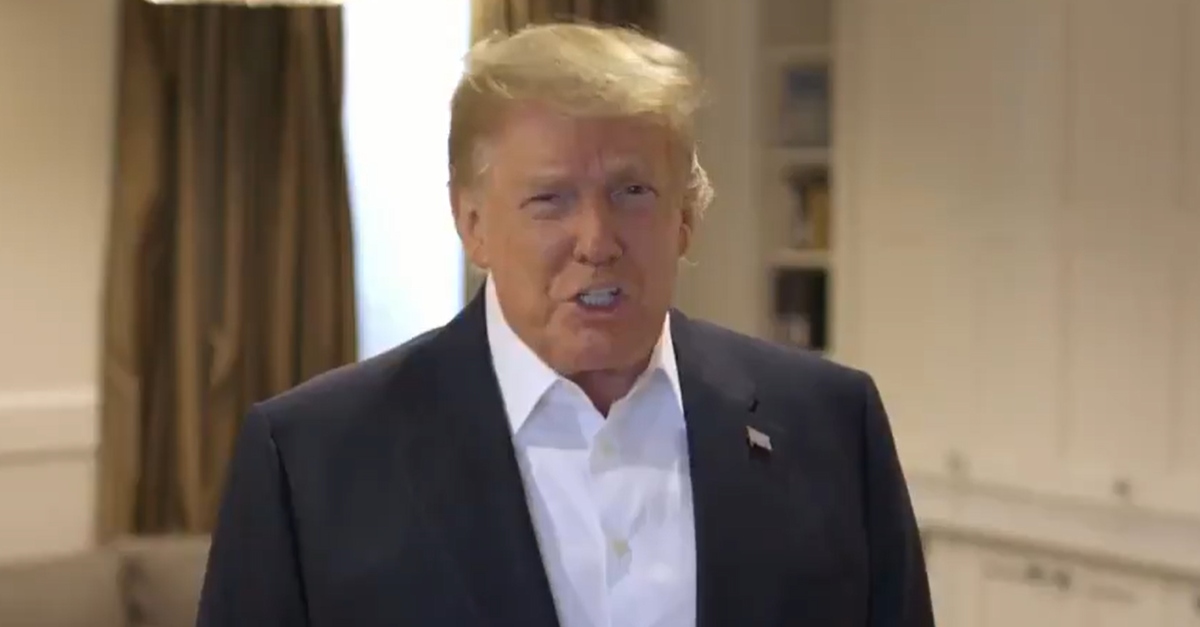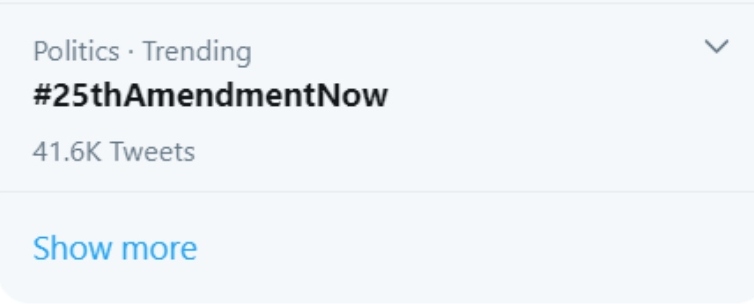
Donald Trump
Ah, yes, the 25th Amendment. It trended again on Twitter Sunday night. Some critics of President Donald Trump long considered this part of the Constitution a possible tool to take his authority away from him. It’s just doubtful anyone could have foreseen the current circumstances before this year. POTUS has COVID-19, and by virtue of his age (74), he is in the high risk category. Well, now some people are suggesting that the president’s current state means he may be in no position to lead the country.

Some critics suggest POTUS may have to temporarily step down while receiving treatment. Harvard Law Professor and prolific Trump critic Laurence Tribe covers the bases.
“If Trump were to become too ill to debate Biden via Zoom, he’d have to hand presidential power to Pence under 25th Amendment Sec 3,” he wrote on Twitter Sunday. “If he refuses, it’d be time for Pence, the Cabinet, and Congress to invoke Sec. 4, taking matters out of Trump’s hands.”
Section 3 of the 25th Amendment would be invoked when a POTUS undergoes surgery. For example, President George W. Bush used section 3 twice in his term of office, having Vice President Dick Cheney serve as acting president.
This part of the amendment is strictly voluntary. In a written statement, POTUS tells both the President pro tempore of the Senate, and the Speaker of the House that he cannot do his job. The VP takes over as acting president, and the actual POTUS walks back that decision later with another written statement.
Simple! Things get more complicated with Section 4 of the 25th Amendment. The VP and a majority of principle officers of the executive department can tell the President pro tempore of the Senate, and the Speaker of the House that the president cannot discharge his duties. As in Section 3, the VP would take over as acting president. But the president can insist that he can do his job. If he does this, the VP and the principle officers of the executive branch have a four day deadline to insist that POTUS is unable to do his job. In this case, both houses of Congress would have to vote on whether the president cannot do his job. If they fall short of the supermajority, then the president can resume his powers. If they meet the supermajority, then the VP continues to act as acting president.
Got it?
“The animating principle of Sections 3 and 4 is continuity,” wrote Professor Brian C. Kalt of Michigan State University in a 2019 op-ed in The Atlantic. “This goal is limited: preventing the helm from being unmanned when a president is completely incapacitated. The point is not to oust presidents who are ‘unable’ in the sense of being lazy, incompetent, or screwy. If the president cannot contest the action (because, say, he is in a coma), Section 4 is designed to transfer power instantly and uncontroversially. But if the president can respond—and whatever else you can say about Trump’s actions and deportment, he surely would respond—Section 4 is designed to protect the president by making it very hard to displace him.”
News of the dexamethasone treatment on Sunday caught the attention of former acting solicitor general Neal Katyal, who served in the Obama administration.
This has 2 impt implications: 1) Dexmethasone has side effects, incl emotional instability. Not good for someone currently holding launch codes. 25th amendment issues re temporary transfer of power now loom, 2) if Trump has a severe case, its a 20 day quarantine period, not 10. https://t.co/4rgOATGEGl
— Neal Katyal (@neal_katyal) October 4, 2020
The World Health Organization notes that dexamethasone treatment “may be associated” with issues complications including “psychological effects (e.g., mood swings, memory issues, confusion or irritation).” But they say side effects are linked to use for more than two weeks.
“To reiterate: All these adverse events are not associated with short term use (with the exception of hyperglycaemia that can worsen diabetes),” they wrote.
The United States National Library of Medicine’s MedlinePlus lists issues, including:
- dizziness
- insomnia
- restlessness
- depression
- anxiety
Constitutional law Professor Michele Landis Dauber, of Stanford Law School, reported that using dexamethasone had a serious effect on her.
I couldn’t be President of my cat when I was on Dexamethasone. He should not be exercising the powers of the Office of President on that drug. We are lucky if he doesn’t start a war. He’s incapacitated.
— Michele Dauber (@mldauber) October 4, 2020
The president’s doctors suggest a promising prognosis.
“The fact of the matter is, he’s doing really well,” Dr. Sean Conley said in a press conference Sunday.
— Donald J. Trump (@realDonaldTrump) October 4, 2020
[Screengrab via Donald Trump]